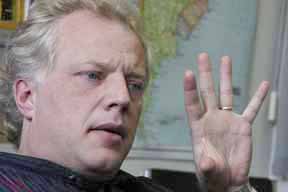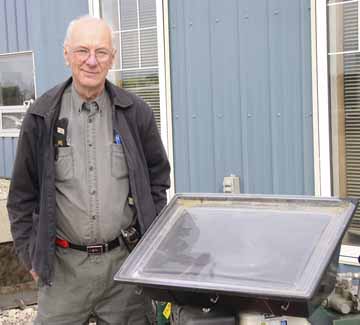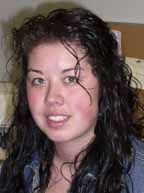Canadian Mennonite
Volume 11, No. 21
October 29, 2007
Three places, one message for mission
Son of missionaries to India follows in his parents’ footsteps with MC Canada Christian Witness
WINNIPEG
Despite his 13 years of international ministry experience, Tim Froese continues to search for one message that will reach everyone, regardless of where they are along life’s journey.
 |
“I have a theory,” says the soft-spoken executive director of international ministries for Mennonite Church Canada Christian Witness. “There are three places where mission is needed. First, the front door of the church, where we present the gospel and invite people in. Second, the pew, where followers of Christ are invited to live the gospel in community with one another. The third is the back door of the church, for those that have “been here, done that,” but have decided to leave. We need to find one message that serves each of those places, because we never know the place where people are when we first meet them.”
The father of three children, Froese spent the first six years of life in Andhra Pradesh Province of India with his missionary parents, where his father served as a medical doctor with Mennonite Brethren Missions and Services for 13 years. This formative experience, combined with life-long modelling by his parents, shaped Froese’s desire to serve. As an adult, he has lived in Canada, the U.S., Panama, Brazil and South Korea. Out of these experiences grew a love of people from a variety of cultures. In South Korea he took a leadership role in founding the Korea Anabaptist Center, now a burgeoning concern for Anabaptist Christians in Korea.
The graduate of the strongly mission-minded Briercrest Bible College in Saskatchewan, the University of Manitoba in recreation studies, and M.Div. studies at Mennonite Brethren Biblical Seminary in Fresno, Calif, loves his multi-disciplinary work. This allows him to integrate the disciplines of business administrator, missionary, historian, theologian, network builder and follower of Jesus.
So what would he do if a million dollar donor walked through the door? ‘I’d ask if the donor can come along with the million dollars. . . .’
His gift for learning languages has also been a boon; Froese speaks Portuguese, Spanish and Korean, in addition to English. But it is clearly his passion for the church—God’s intended change-agent in the world—that permeates Froese’s being. “In seminary, a professor said that next to the question of who God is, the question of what the church is, will have the biggest influence on one’s view of life and ministry.”
Together with three home office staff, Froese administers 60-plus ministry workers in more than 30 countries. “I am very fortunate to be a paid change-agent where the rubber hits the road, where you can engage churches, people in the pews, pastors—those who are asking how to engage the world, the youths, the struggles in the world,” he says thoughtfully.
One big concern Froese has for the future of missions is the human ambivalence propagated by the information age. In fast-paced Western society, the world’s most privileged people—a small proportion of the entire global population—are driven by 90-second sound bites and video clips on CNN and the Internet. People are lulled into a false sense of knowledge about what life is really like for generations of people raised on poverty and violence. “We think we know what it’s like because we’ve seen the pictures. But if we haven’t lived it, we have no idea,” says Froese.
Nov. 11 is the day that Mission Sunday is officially acknowledged in Mennonite Church Canada and MC USA—and it’s also a day that special offerings are often dedicated to missions. Froese, however, insists that every day should be Mission Sunday.
So what would he do if a million dollar donor walked in the door? “I’d ask if the donor can come along with the million dollars. I’m after people, not just their money. People make the difference. If I could get that donor to sponsor 100 of his family and friends to disperse into the world to learn and walk beside others, maybe that’s what I’d do with it.”
Froese sums up this idea with a quote from Tim Dearborn, an author, theologian and educator: “It is not the church of God that has a mission in the world, but the God of mission that has a church in the world.”
Profile of a generous man
Edmonton
 |
What would you do if you had a million dollars? The whimsical 1992 Barenaked Ladies’ song, “If I Had A Million Dollars,” proposes buying a fur coat and expensive ketchup for macaroni and cheese. Unfortunately, though, many adults never move beyond self-centredness with their own wealth.
Frank Flaman is not one of them. As head of the Flaman Group of Companies, he invests his profits in people, creating the Frank Flaman Foundation to assist existing local and international charities. In the last two years, Mennonite Central Committee (MCC) has become a benefactor, joining organizations like World Vision, Operation Eyesight, Mother Teresa Missionaries of Charity, and Change for Children.
Flaman learned about MCC through a customer who told him of a golf tournament fundraiser in Tofield, Alta. “I didn’t realize how big they were, but MCC is quite big and they do a big job,” Flaman says. One of the things attracting him to MCC is its inclusiveness. “You help everyone, it doesn’t matter what religion they are,” he says enthusiastically.
Flaman grew up Catholic, but admits, “I’m not much of a church-goer really. I come from a small town north of Regina [where] you never heard much about raising money for the Third World. . . . I admire the Mennonites; they do more than any other religion per capita.”
A passion for helping is something Flaman wants to spread. In May, he took a group of his employees to Guatemala to see MCC at work. Such trips are an employee incentive and learning opportunity. “Instead of going to Hawaii, go on a trip like this. It will be more rewarding,” Flaman says. “I want them to realize they’re not working for me. Some might say, ‘You know, Frank, instead of giving this money, why not increase our bonuses or salaries?’ But who’s running short here? Who doesn’t have food in his fridge, or a home?”
Flaman’s passion for improving lives includes an active interest in fitness and the environment. Currently he is investigating solar cookers for the poor in Third World countries. “I didn’t realize how big this solar cooking is,” he says. “How primitive, they cook [in the Third World]. In the kitchen there’s a steel plate with wood under it. People who cook there . . . it’s as bad as smoking two packs of cigarettes a day. With the solar cooker, it’s healthier, better for the environment and it can be a cost benefit. In some places, in extreme cases, they earn $2 a day and 50 cents goes for wood or charcoal.”
Flaman has a clear vision for how he wants to make a difference in the world. “I drive a small car. I don’t have a cottage at the lake. . . . I live a frugal life. We just live in a regular condo, two-bedroom. So instead of buying a million-dollar house, my money goes to charity.”
For those with a million dollars, consider Frank Flaman and be inspired.
Trip proves an eye-opener for Flaman employee
Twenty-year-old Jillian Van Nistelrooy describes her trip to Guatemala with a group of Frank Flaman’s employees as life-changing. “You come back and you really take stock of your life and try to make some changes,” she says.
 |
“It was huge,” she says of the differences between her own life and that of those she met in Guatemala. “I’m only 20. My whole life revolves around stupid things. You come back from a place like that and . . . my priorities have changed. . . . Everything [Frank] works for goes towards helping others; therefore, everything I work for goes toward helping others. It made me feel really good about the job I have and the place I’m at right now.”
The group saw MCC projects the Flaman Foundation was supporting, such as fish farming, medicinal gardens and tree farming. Van Nistelrooy was impressed by how aid was given, noticing that recipients were being equipped for self-sufficiency.
Before the trip, she had never heard of MCC, but she liked what she saw. It was clear to her that MCC was working with the people, not for them. “Everyone was on the same level . . . everyone’s opinion was valued,” she says.